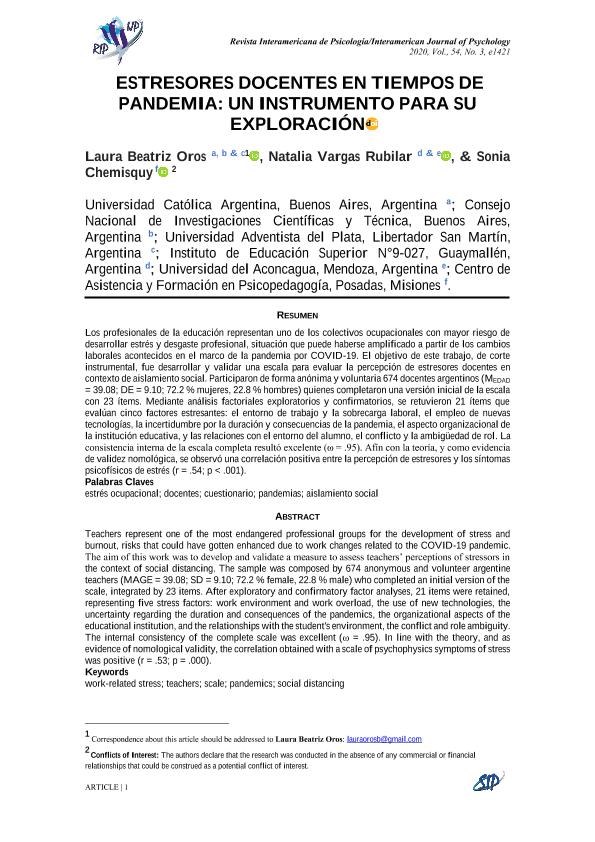Mostrar el registro sencillo del ítem
dc.contributor.author
Oros, Laura Beatriz

dc.contributor.author
Vargas Rubilar, Natalia
dc.contributor.author
Chemisquy, Sonia
dc.date.available
2021-09-02T14:36:58Z
dc.date.issued
2020-12
dc.identifier.citation
Oros, Laura Beatriz; Vargas Rubilar, Natalia; Chemisquy, Sonia; Estresores docentes en tiempos de pandemia: Un instrumento para su exploración; Sociedad Interamericana de Psicología; Revista Interamericana de Psicología; 54; 3; 12-2020; 1-29
dc.identifier.issn
0034-9690
dc.identifier.uri
http://hdl.handle.net/11336/139539
dc.description.abstract
Los profesionales de la educación representan uno de los colectivos ocupacionales con mayor riesgo de desarrollar estrés y desgaste profesional, situación que puede haberse amplificado a partir de los cambios laborales acontecidos en el marco de la pandemia por COVID-19. El objetivo de este trabajo, de corte instrumental, fue desarrollar y validar una escala para evaluar la percepción de estresores docentes en contexto de aislamiento social. Participaron de forma anónima y voluntaria 674 docentes argentinos (MEDAD = 39.08; DE = 9.10; 72.2 % mujeres, 22.8 % hombres) quienes completaron una versión inicial de la escala con 23 ítems. Mediante análisis factoriales exploratorios y confirmatorios, se retuvieron 21 ítems que evalúan cinco factores estresantes: el entorno de trabajo y la sobrecarga laboral, el empleo de nuevas tecnologías, la incertidumbre por la duración y consecuencias de la pandemia, el aspecto organizacional de la institución educativa, y las relaciones con el entorno del alumno, el conflicto y la ambigüedad de rol. La consistencia interna de la escala completa resultó excelente (ω = .95). Afín con la teoría, y como evidencia de validez nomológica, se observó una correlación positiva entre la percepción de estresores y los síntomas psicofísicos de estrés (r = .54; p < .001).
dc.description.abstract
Teachers represent one of the most endangered professional groups for the development of stress and burnout, risks that could have gotten enhanced due to work changes related to the COVID-19 pandemic. The aim of this work was to develop and validate a measure to assess teachers’ perceptions of stressors in the context of social distancing. The sample was composed by 674 anonymous and volunteer argentine teachers (MAGE = 39.08; SD = 9.10; 72.2 % female, 22.8 % male) who completed an initial version of the scale, integrated by 23 items. After exploratory and confirmatory factor analyses, 21 items were retained, representing five stress factors: work environment and work overload, the use of new technologies, the uncertainty regarding the duration and consequences of the pandemics, the organizational aspects of the educational institution, and the relationships with the student's environment, the conflict and role ambiguity. The internal consistency of the complete scale was excellent (ω = .95). In line with the theory, and as evidence of nomological validity, the correlation obtained with a scale of psychophysics symptoms of stress was positive (r = .53; p = .000).
dc.format
application/pdf
dc.language.iso
spa
dc.publisher
Sociedad Interamericana de Psicología
dc.rights
info:eu-repo/semantics/openAccess
dc.rights.uri
https://creativecommons.org/licenses/by-nc/2.5/ar/
dc.subject
PANDEMICS
dc.subject
SCALE
dc.subject
SOCIAL DISTANCING
dc.subject
TEACHERS
dc.subject
WORK-RELATED STRESS
dc.subject
COVID-19
dc.subject.classification
Otras Psicología

dc.subject.classification
Psicología

dc.subject.classification
CIENCIAS SOCIALES

dc.title
Estresores docentes en tiempos de pandemia: Un instrumento para su exploración
dc.title
Teachers' Stressors in Times of Pandemic: An Instrument for Their Exploration
dc.type
info:eu-repo/semantics/article
dc.type
info:ar-repo/semantics/artículo
dc.type
info:eu-repo/semantics/publishedVersion
dc.date.updated
2021-08-31T14:25:04Z
dc.journal.volume
54
dc.journal.number
3
dc.journal.pagination
1-29
dc.journal.pais
Brasil

dc.journal.ciudad
Porto Alegre
dc.description.fil
Fil: Oros, Laura Beatriz. Pontificia Universidad Católica Argentina "Santa María de los Buenos Aires"; Argentina. Universidad Adventista del Plata; Argentina. Consejo Nacional de Investigaciones Científicas y Técnicas; Argentina
dc.description.fil
Fil: Vargas Rubilar, Natalia. Universidad del Aconcagua; Argentina
dc.description.fil
Fil: Chemisquy, Sonia. Centro de Asistencia y Formación En Psicopedagogía; Argentina
dc.journal.title
Revista Interamericana de Psicología

dc.relation.alternativeid
info:eu-repo/semantics/altIdentifier/doi/http://dx.doi.org/10.30849/RIPIJP.V54I3.1421
Archivos asociados
